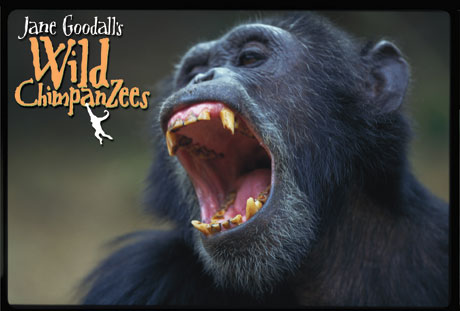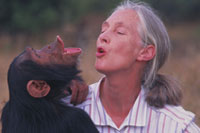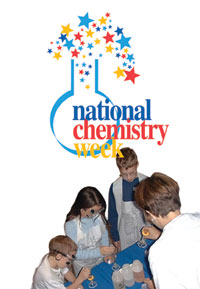
Jane Goodall's Wild Chimpanzees
By M.A. Jackson
There
have been two great Janes of the jungle—Tarzan's
Jane and the primatologist Dr. Jane Goodall. Both
have had plenty of screen time thanks to B movies
and National
Geographic specials, respectively. But Goodall
is the only Jane to have an Imax movie all about
her. Jane
Goodall's Wild Chimpanzees is a 40-minute
look at Goodall's four decades of groundbreaking
wild
chimpanzee research in Tanzania's Gombe Stream
National Park.
 Goodall narrates the film that opens
with black and white archival footage of her
early years at
Gombe—although
there wasn’t much to see during her first
few months as the chimps ran from her in terror.
But Goodall’s
persistence paid off as the touching scene of
her first physical contact with Fifi, an infant
chimp
brazen
enough to approach the human intruder, attests.
In addition, Jane Goodall’s Wild Chimpanzees provides
a comprehensive overview of her work, introduces
young researchers continuing Goodall’s
work, and features contemporary footage of Goodall
at
Gombe with her now-famous
chimpanzee subjects—Fifi (now a mother
herself), alpha male Frodo, Gremlin, Gaia, twins
Golden and
Glitter, and Titan. Goodall narrates the film that opens
with black and white archival footage of her
early years at
Gombe—although
there wasn’t much to see during her first
few months as the chimps ran from her in terror.
But Goodall’s
persistence paid off as the touching scene of
her first physical contact with Fifi, an infant
chimp
brazen
enough to approach the human intruder, attests.
In addition, Jane Goodall’s Wild Chimpanzees provides
a comprehensive overview of her work, introduces
young researchers continuing Goodall’s
work, and features contemporary footage of Goodall
at
Gombe with her now-famous
chimpanzee subjects—Fifi (now a mother
herself), alpha male Frodo, Gremlin, Gaia, twins
Golden and
Glitter, and Titan.
Although an animal lover
since childhood, Goodall stumbled into her
life’s
work. In 1957, she was hired to assist noted
paleontologist/ anthropologist Dr.
Louis Leakey on a fossil-hunting dig in Africa's
Olduvai Gorge. It was Leaky who arranged for
Goodall to travel
to study the behavior of the chimpanzees at
Gombe. In 1960, Goodall started her adventure—she
was 26-years-old and had never seen a chimpanzee
in the
wild.
Filmed in 1999 over a four-month period,
Jane Goodall’s
Wild Chimpanzees features rare footage
of chimpanzees interacting in their community,
playing with one
another (and their baboon neighbors), grooming,
hunting, communicating,
and using tools to find food.
It was Goodall
who discovered that chimps use tools—a
revelation that literally revolutionized
the understanding of chimp behavior. Goodall
also proved that chimps
have distinct personalities, hunt for and
eat meat, and participate in war-like behavior.
Today,
Goodall spends the majority of her time promoting
the preservation of chimpanzees
and
the environment
through touring and speaking engagements.
But her work continues as the longest running
research
project of
its kind.
Jane Goodall’s Wild Chimpanzees provides
viewers with a better understanding of Goodall’s
passion for primates. The chimps she studied
have distinct
personalities and traits that mirror human
behavior—from
tender and sneaky to grouchy and troublesome.
After seeing the movie it should come as
no surprise—as
it did to Goodall—that chimps are human’s
closest animal relative (we share nearly
99 percent of the same DNA).
Although chimpanzee
populations are on the
decline—there
are fewer than 150,000 chimpanzees in Africa
today while in 1900 there were one to two
million—without
Goodall’s research and preservation
efforts,
Wild Chimpanzees could very well
have been eradicated by now due to poaching
and
habitat loss. Jane Goodall’s
Wild Chimpanzees is so inspiring
viewers may find themselves changing their
names to
Jane and moving
to the jungle
.
Back to Contents
 National
Chemistry Week: National
Chemistry Week:
Earth’s Atmosphere and Beyond!
October 24-25, 2003
Carnegie Science Center
10a.m.-5p.m.
This year Carnegie Science Center presents its 5th
Annual National Chemistry Week on Friday and Saturday,
October 24-25. The activities will honor the innovators
and pioneers of aviation and atmospheric chemistry,
and the date coincides with the 100th anniversary of
the Wright Brother’s first powered flight.
The
theme of Earth’s Atmosphere and Beyond will
be featured at over 25 tables with chemistry-related,
hands-on science experiments, activities and demonstrations.
These events are designed for all ages and are hosted
by corporations, societies and universities. All-day
shows are featured at Carnegie Science Center Theater
during these two special days.
In celebration of National
Chemistry Week, Carnegie Science Center is also
hosting a Girl Scout Overnighter
on Friday October 24. The activities presented
will allow participants to earn a National Chemistry
Week
Girl
Scout Patch.
Sponsors for National Chemistry Week
in Pittsburgh include The Pittsburgh Section of
the American Chemical
Society, The Spectroscopy Society of Pittsburgh,
Society for Analytical Chemists of Pittsburgh,
and Bayer Corporation.
Funds contributed to the event help support underserved
Girl Scout overnighter and school group visits.
Back to Contents |